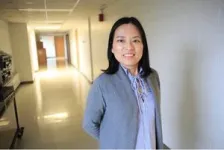(Press-News.org) Societies and political structures, like the humans they serve, appear to become more fragile as they age, according to an analysis of hundreds of pre-modern societies. A new study, which holds implications for the modern world, provides the first quantitative support for the theory that the resilience of political states decreases over time.
Triggers of societal collapse have been well studied and vary from conquest and coups to earthquakes and droughts. This new study shows that pre-modern states faced a steeply increasing risk of collapse within the first two centuries after they formed. The research identifies several mechanisms that could drive these aging effects. Some of the mechanisms, like environmental degradation and growing economic inequality, are still at work today.
The findings, published in the Proceedings of the National Academy of Sciences, highlight the need to understand internal processes that may contribute to the demise of states, says SFI External Professor Tim Kohler (Washington State University).
“We tend to concentrate on external drivers such as drought or catastrophes. Yes, these have a role, but often they are just triggers that are effective, or not, depending on the internal dynamics of particular societies,” says Kohler.
How states and great powers rise and fall has been an enigma that has puzzled historians for years. In this study, the researchers looked at this question from a new angle, by analyzing longevity in 324 pre-modern states spanning five millennia.
“This approach is commonly used to study the risk of death in aging humans, but nobody had the idea to look at societies this way,” says SFI External Professor Marten Scheffer (Wageningen University), lead author of the study.
In humans, the risk of dying doubles approximately every 6-7 years after infancy. As that exponential process compounds with great age, few people survive more than 100 years. The authors show that it works differently for states. Their risk of termination rises steeply over the first two centuries but then levels off, allowing a few to persist much longer than usual.
They found a similar pattern all over the world from European pre-modern societies to early civilizations in the Americas to Chinese dynasties.
“Ancient Chinese states or dynasties had an upper limit of longevity around 300 years across the past two millennia. This middle-school textbook knowledge in China has a myriad of explanations, but no consensus has been reached,” says co-author Chi Xu of Nanjing University in China. “Perhaps the answer is underneath the global pattern of human civilizations — what happened in ancient China is a perfect reflection that all societies will age and become vulnerable.”
Societies today differ in many ways from the pre-modern states studied by the authors. Nonetheless, according to Scheffer, humans should not expect modern societies to be immune to the mechanisms that drove the waxing and waning of states for thousands of years.
“Mechanisms that destabilized past societies remain relevant today,” Sheffer says. “Indeed, perceived unfairness and scarcity exacerbated by climatic extremes may still drive discontent and violence.”
Current threats to global society make these findings particularly applicable, adds co-author Tim Lenton from the University of Exeter.
“As our society enters a climate and ecological crisis of our own making the evidence that it is getting less resilient just increases the systemic and existential risks we are facing,” he says. “A glimmer of hope is that some past societies pulled through crises and lived much longer — but they had to reinvent themselves in the process.”
END
Aging societies more vulnerable to collapse
2023-12-01
ELSE PRESS RELEASES FROM THIS DATE:
Pathogens use force to breach immune defenses, study finds
2023-12-01
BLOOMINGTON, Ind. — Similar to a burglar breaking a window to get into a house, Indiana University researchers have discovered a previously unknown process by which pathogens enter a cell with physical force, breaching the body's immune defenses that prevent infection.
The work, published in the journal Proceedings of the National Academy of Sciences, introduces a potential game-changer in the fight against intracellular pathogens responsible for causing devastating infectious diseases, such as tuberculosis, malaria and chlamydia. These diseases are notoriously ...
Keeping Texas bridges ‘safe and usable for years to come’
2023-12-01
Texas has the second-most bridges in the United States after California, 30% of which do not have sufficient height, width or capacity to handle the increasing volume and type of traffic using them.
Nur Yazdani, a civil engineering professor at The University of Texas at Arlington, has received a three-year, $997,275 grant from the Texas Department of Transportation (TxDOT) to evaluate the performance of selected deteriorating and aging highway bridges. His approach includes non-destructive evaluation (NDE), on-site load testing and computer simulation to help engineers determine the current condition of bridges ...
Ghostlike dusty galaxy reappears in James Webb Space Telescope image
2023-12-01
It first appeared as a glowing blob from ground-based telescopes and then vanished completely in images from the Hubble Space Telescope. Now, the ghostly object has reappeared as a faint, yet distinct galaxy in an image from the James Webb Space Telescope (JWST).
Astronomers with the COSMOS-Web collaboration have identified the object AzTECC71 as a dusty star-forming galaxy. Or, in other words, a galaxy that’s busy forming many new stars but is shrouded in a dusty veil that’s hard to see through — from nearly 1 billion years after the Big Bang. ...
A leader in Texas water management
2023-12-01
A University of Texas at Arlington civil engineer is leading a statewide initiative to use more accurate forecasting to guide reservoir storage and release to improve water supply reliability and reduce flood damages.
Yu Zhang, a UT Arlington associate professor in the Department of Civil Engineering, is heading a new project—“Advancing Forecast-Informed Drought Planning for the West Gulf Region Through Integration of Climate Forecasts and Predictions of Reservoir Water Balance Predictions”—funded by the National ...
Public gardens contribute to invasives problem
2023-12-01
Botanist Denis Conover does not have to go far to study the growing problem of invasive plants.
During an autumn stroll outside his office at the University of Cincinnati, the biology professor pointed out numerous examples of nonnative, invasive species in campus landscaping.
“This is winged euonymus, otherwise known as burning bush. And here is Chinese silver grass. It’s a popular ornamental, but the seeds are dispersed by the wind,” he said.
And there were many others: English ivy, wintercreeper, Callery pear.
For his latest study published in the journal Ecological Restoration, he and his students examined the impact ...
Rett patients receive a new gene therapy treatment at Texas Children’s Hospital and Baylor College of Medicine
2023-12-01
Texas Children’s Hospital, an internationally-recognized, top-ranked children’s hospital and pediatric research center affiliated with Baylor College of Medicine, is the first to deliver a novel gene therapy to treat Rett syndrome in pediatric patients. Two female patients with Rett syndrome were the first children worldwide to receive this promising treatment.
This exciting milestone is part of an ongoing first-in-human Phase I/II trial of a new investigational gene therapy, NGN-401, conducted by Neurogene Inc., a clinical-stage company founded to bring life-changing genetic medicines to patients ...
A color-based sensor to emulate skin's sensitivity
2023-12-01
Robotics researchers have already made great strides in developing sensors that can perceive changes in position, pressure, and temperature – all of which are important for technologies like wearable devices and human-robot interfaces. But a hallmark of human perception is the ability to sense multiple stimuli at once, and this is something that robotics has struggled to achieve.
Now, Jamie Paik and colleagues in the Reconfigurable Robotics Lab (RRL) in EPFL’s School of Engineering have developed a sensor that can perceive combinations of bending, stretching, compression, and temperature changes, all using a robust system that boils down ...
SFU researchers sound out Canadian military’s plan to combat ocean noise pollution
2023-12-01
new study from Simon Fraser University researchers examines the Canadian military’s efforts to reduce the impacts of underwater noise pollution on species during training exercises in the Pacific Ocean but caveat that more can still be done.
The paper, published today in Marine Policy, takes aim at a report commissioned by the Canadian Department of National Defence (DND) to reduce the effects of noise pollution from military small-arms munitions training within “Whiskey Hotel”, a 330-square-kilometre ...
Coverage of Bruce Willis’ frontotemporal degeneration shows media misconstrues the disease
2023-12-01
A new paper in Innovation in Aging, published by Oxford University Press, shows that a great deal of media coverage of the actor Bruce Willis’ condition, frontotemporal degeneration, was inaccurate, revealing the public’s limited knowledge of the disease.
In 2022, Willis’ family released a statement saying that he had been diagnosed with aphasia, an acquired language impairment, and would retire from acting. Ten months later, the family issued another statement indicating doctors had diagnosed Willis with a more specific condition, frontotemporal degeneration. ...
Potential pitfalls when using the Cre-LoxP system in cancer research
2023-12-01
“One limitation [of Cre-LoxP], the focus of this editorial, is the potential loss of fidelity of Cre recombinase expression especially in the context of modeling cancer in mice.”
BUFFALO, NY- December 1, 2023 – A new editorial paper was published in Oncoscience (Volume 10) on November 14, 2023, entitled, “Be mindful of potential pitfalls when using the Cre-LoxP system in cancer research.”
In this new editorial, researchers Piotr Czarnota and Jaroslaw Cisowski from Jagiellonian University discuss Cre-LoxP — a widely used system to conditionally modify gene expression in mouse models of cancer and other diseases.
“It ...








